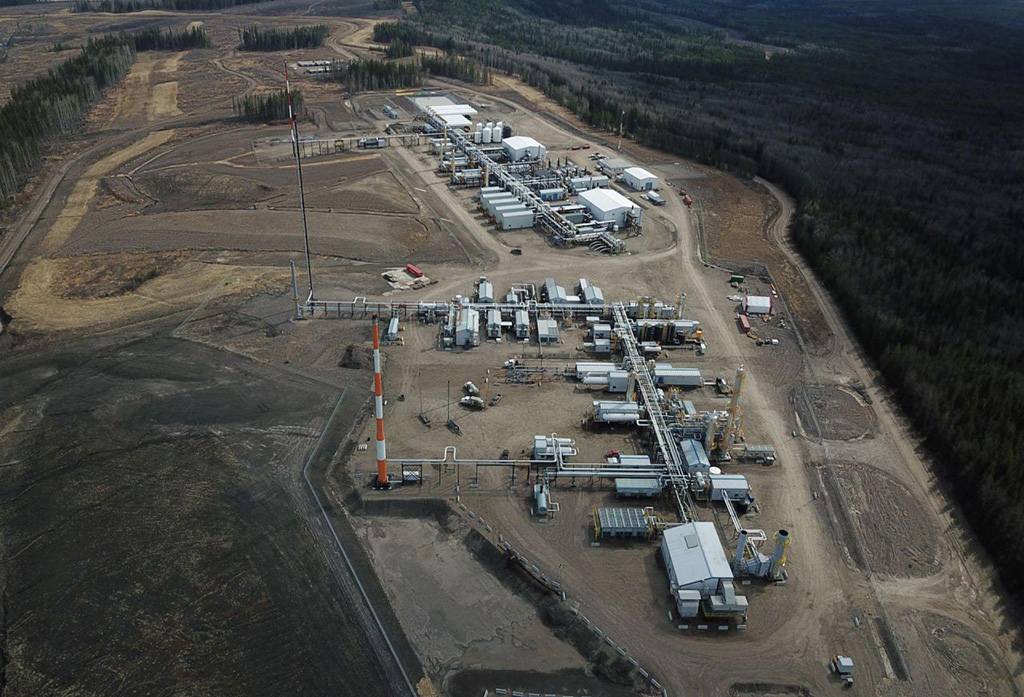Last year the provincial government gave away $1.2 billion in a single fossil fuel subsidy known as the Deep Well Royalty Credit, a tax credit for hydraulic fracturing wells, according to new analysis by Stand.earth.
This takes the lion’s share of the possible $1.9 billion that fossil fuel companies saved thanks to various subsidies over the same time period, calculates the environmental advocacy group.
This week’s analysis applied the World Trade Organization’s definition of a fossil fuel subsidy to the 2022 provincial budget to crunch these numbers, said Sven Biggs, Canadian oil and gas program director with Stand.earth. A simplified version of the definition is “any government funding that either goes to the production of fossil fuels or helps reduce the cost of purchasing them,” he said.
Stand.earth is calling for B.C. to phase out all fossil fuel subsidies and cancel royalty credits. Subsidies incentivize fracking, which goes against the province’s climate and reconciliation goals, Biggs said.
The Deep Well Royalty Credit has amassed $3.4 billion in credits, which means future governments will miss out on billions in royalty revenue on natural gas, he said. Cancelling credits and phasing out subsidies means the oil and gas industry would not be financially viable and would wind down the industry — giving B.C. a shot at actually hitting its 2030 climate goals, he added.
The Tyee contacted the province’s Ministry of Energy, Mines and Low Carbon Innovation with questions about if the royalty review would cancel the Deep Well Royalty Credit, and if the government planned to phase out fossil fuel subsidies by 2023, a campaign pledge made by the federal Liberals on their way to winning last year’s election. The ministry did not answer these questions and instead pointed to the current royalty review, which will be made public “this spring.”
In an emailed statement B.C. Green Party Leader Sonia Furstenau pointed to the several climate-related weather events that buffeted British Columbians. “In a climate crisis every dollar spent subsidizing fossil fuel development in unconscionable,” she said. “The BC NDP are trying very hard to green wash their brand while they continue to subsidize the fossil fuel industry with public funds.”
The BC Liberals were also contacted for comment but were not available.
Subsidies reduce the royalties companies pay the government to access publicly owned resources, like natural gas or oil.
It’s a bit like a landlord and tenant situation, Biggs said. Companies pay monthly rent to the government to access the resources — those are royalty payments. Subsidies are like coupons handed out to tenants to reduce the rent, which can be cashed in at different times.
The subsidies given to B.C.’s oil and gas industry have been on the rise ever since Gordon Campbell’s BC Liberals bet that natural gas would be a big windfall for the province, Biggs said. But it’s not just the Liberals who have been helping companies out: subsidies have doubled since the BC NDP took power in 2018, according to a 2021 report by Stand.earth.
During the last election the BC NDP pledged to review the oil and gas royalty system, a process that is still underway. Environmental organizations were hoping to see the review released as part of the 2022 budget released last month, but were disappointed.
The province commissioned an independent assessment, which last year called the royalty system “broken.” The province also sought public opinion, which leaned heavily towards calling for higher royalties and lower subsidies.
When reached for comment, the Canadian Association of Petroleum Producers issued a statement about the importance of B.C.'s natural gas industry, which it says produces fewer emissions than international companies. In 2019 the natural gas exports were worth $2.8 billion, and since 2003 the oil and gas industry has “generated $24 billion in direct provincial government oil and natural gas revenues,” said Jay Averill, a CAPP spokesperson. (That's about $1.3 billion per year in revenue, which is close to the $1.2 billion B.C. spent on the DWRC subsidies last year.)
The CAPP website contests that tax measures should be considered subsidies and argues the oil and gas industry has the right to access tax measures available to other industries.
For anyone who has been paying close attention to oil and gas subsidies in B.C., this latest report might cause some head scratching. After all, the numbers keep changing.
Last month, The Tyee covered an International Institute for Sustainable Development report that said B.C. handed out $1.3 billion in fossil fuel subsidies over the past two years — $765 million in 2020/21, and $566 million so far during the current fiscal year. This report also used the WTO’s definition of a subsidy.
Last summer a Stand.earth report said B.C. had handed out $1.3 billion in a single year, which it now calculates to be $1.9 billion.
There are a couple reasons for the disparity, Biggs said.
Fossil fuel subsidies are always calculated using public documents, which don’t always offer the best cost breakdowns.
Stand.earth’s analysis includes the provincial sales tax exemption for residential energy — a subsidy worth $278 million last year, the second-highest subsidy in B.C. But not all of that is a subsidy, Biggs said.
In a piece published by The Tyee, B.C.’s minister of energy disagreed with how Stand.earth defined that exemption as a subsidy for the oil and gas industry.
“Some of this is a fossil fuel subsidy — the part that reduces the cost of buying natural gas or home heating oil. The part that subsidized electricity is not,” Biggs acknowledged. “Unfortunately the province, in the documents they make publicly available, doesn’t break down what part of the exemption is going towards which energy source.”
Another subsidy that draws debate is the CleanBC Program for Industry, which collects carbon taxes from companies and then uses those funds to incentivize companies to reduce their emissions. The province previously told The Tyee it does not consider this a subsidy, whereas Stand.earth said it gives public money to fossil fuel companies, so it is.
“This kind of debate is happening all over the world, over what exactly a fossil fuel subsidy is,” Biggs said.
This is why Biggs said Stand.earth’s subsidy estimation of $1.9 billion is “the maximum amount of fossil fuel subsidies that could be in the province based on publicly available information.”
One subsidy that is never debated is the Deep Well Royalty Credit. At $1.2 billion, it’s the largest subsidy in the province.
It’s also consistently underestimated by provincial accountants.
In the 2021 budget the province estimated the Deep Well Royalty Credit would cost $514 million — less than half of what it actually turned out to cost.
Biggs said it’s a long-term government trend to underestimate the cost of subsidies and over-estimate the revenue fossil fuels will bring in. This latest disparity could also be due to the recent spike in natural gas prices, incentivizing more production and therefore earning companies more credits, and because companies are cashing in their accumulated credits before the royalty review is released later this spring.
Biggs said he’s concerned the royalty review will cancel the Deep Well Royalty Credit and reintroduce a similar subsidy under a different name — although he said the government will likely try to avoid a similar surplus of credits in the future.
The best way to avoid surpluses or any other kind of system manipulation is to create a royalty system that is as simple and transparent as possible, Biggs said. ![]()
Read more: Energy, BC Politics
















Tyee Commenting Guidelines
Comments that violate guidelines risk being deleted, and violations may result in a temporary or permanent user ban. Maintain the spirit of good conversation to stay in the discussion.
*Please note The Tyee is not a forum for spreading misinformation about COVID-19, denying its existence or minimizing its risk to public health.
Do:
Do not: